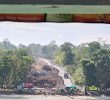DAVAO CITY, Philippines — Farmers groups on Friday (Feb. 14) called the first-year implementation of the Republic Act 11203 or Rice Liberalization Law (RLL) as “destructive” to the country’s local rice industry.
Former Anakpawis Party-list Rep. Ariel Casilao, in a statement on Friday, said that the measure “undermined food security and worsened import-dependence”.
President Rodrigo Duterte signed RA 11203, removing quantitative restrictions on rice imports supposedly to curb the increases in prices of rice in the market.
Consequently, the Philippines was declared in the latter part of 2019 as the top global rice importer based on a report of the United States Department of Agriculture (USDA).
The said law, however, is taking a toll on local farmers.
“Liberalization is a historical scourge to Filipino peasants. Since the country’s entry to the World Trade Organization and [the] influx of imported rice, farmers have been its usual victims,” Casilao said.
Last year, Anakpawis, rice watchdog Bantay Bigas, and Amihan Federation of Peasant Women submitted to House of Representatives a petition with 50,000 signatures gathered across the country for the repeal of the measure.
Bantay Bigas said that they are aiming another batch of 100,000 signatures by March.
Members of the Makabayan bloc at the House of Representatives have also filed a bill seeking the repeal of RA 11203.
Gabriela Party-list also filed House Bill 477 or the Rice Industry Dev’t Act (RIDA) first pushed by the Anakpawis Party-list in the previous Congress. The measure, they said, aims to ensure rice self-sufficiency in the country.
Gabriela Rep. Arlene Brosas lamented that the RA 11203 led to a “significant boom” in the rice importation business.
Huge rice imports
Research group Ibon Foundation estimates that farmers suffered an income loss of P84.8 billion in 2019 due to a “catastrophic” drop in palay farmgate prices following huge rice imports.
This translates to an average of P35,328 income loss per rice farmer.
The group noted that the Philippines imported a record-high 3.2 million metric tons (MMT) of rice in 2019, surpassing the previous record of 2.4 MMT of rice imports in 2008 by 40 percent.
The country’s rice importation grew from the equivalent of around 5 percent of total rice production in 2016 at the start of the Duterte administration to 26 percent of total rice production in 2019, the group said.
Ibon also said that rice liberalization policy is “another indication of the government’s long-time neglect and disregard of local rice production and agriculture in general.”
Devastated farmers’ livelihood
In South Cotabato, farmers marked the first-year implementation of RLL through a protest action in Koronadal City Public Market.
Bantay Bigas-South Cotabato, an alliance of farmers, rice millers, traders, government officials, and consumers in the province, slammed President Duterte for signing the RA 11203 despite the opposition of Filipinos.
“For a year, the rice liberalization has been dealing devastation to 2.5 million Filipino farmers, while many personnel of NFA [National Food Authority] is facing massive displacement, and thousands have already lost their jobs due to the stoppage of operation to
4,000 rice mills across the country,” said John Madero, spokesperson of Bantay Bigas South Cotabato.
[Isang taon ng nanalasa ang liberalisasyon sa bigas sa kabuhayan ng 2.5 milyong magsasakang Pilipino, habang kumakaharap sa malawakang tanggalan ang mga kawani ng NFA at daanlibo na rin ang nawalan ng trabaho buhat ng tumigil sa operasyon ang 4,000 rice mills sa buong bansa.]
Citing a study from Masipag-Mindanao, a network of farmers and scientists, about 75-85 percent was reportedly lost from the profit of local farmers due to RLL.
In Lake Sebu, South Cotabato, for example, the group said that some farmers noted a sharp decline in profit from around P12,000 in one hectare to only P2,000 in one cropping.
“We are calling to repeal this law immediately. What we need is to strengthen the rice industry based on the principles of food security and self-reliance,” Madero said.
[Nananawagan kami na dapat hindi na patagalin ang pahirap na batas na ito at sa kagyat ay ipawalambisa na. Ang kailangan natin sa ngayon ay ang pagpapalakas sa industriya ng bigas na nakabatay sa prinsipyo ng kaseguruhan sa pagkain ay self-reliance.] (davaotoday.com)










